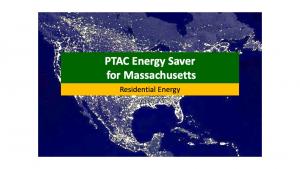- 1 read

Our GREENandSAVE Team is pleased to share information like this about sustainability solution providers. If you would like to submit information on your company, please contact us.
TIME TO ACT: Save 20% or more on HVAC. It’s important now more than ever for a sustainable future!
Optimizing PTAC units with a “smart” device is a fast, easy, and cost-effective way to achieve Residential HVAC Energy Savings. A Packaged Terminal Air Conditioner is a type of self-contained heating and air conditioning system commonly found in: Hotels, Motels, Senior Housing Facilities, Hospitals, Condominiums, Apartment Buildings, and Add-on Rooms & Sunrooms.
Business owners and homeowners face increasing challenges with energy costs to save energy and money in Massachusetts PTAC Energy Saver offers an Adaptive Climate Controller (ACC). It is a proven HVAC energy saving device that quickly installs on PTAC units. There are many companies that claim to produce energy savings, but the ACC device is multi-panted and proven over many years. Plus, it has extensive validation tests by organizations such as:
- ConEdison, Manhattan Plaza New York City
- Environmental Test Laboratory, Ohio
- EME Consulting Engineers (Third Party), Sponsored by NYSERDA, New York
- State University of New York, Oneonta, NY
- Tim Garrison (Third Party Testing)
- McQuay Cooling Tests
- Purdue University Tests (Phoenix)
- ConEdison Tests by ERS
Typically, when an HVAC system turns off, shortly after, the blower fan motor turns off. The ACC reprograms the blower fan not to shut off but to throttle back the rpm airflow to an exceptionally low speed, quiescent level airflow or “idle speed”. This allows for a gentle but continuous air movement into the building that helps keep equilibrium of climate conditions in the occupied space and saved energy.
PTAC Energy Saver can help you navigate the complexity of HVAC energy saving choices: CONTACT PTAC Energy Saver
Here is an example of some Residential HVAC Energy Saving info for Massachusetts:
Mass Save is prepared to align its mission with the state's new law requiring that greenhouse gas emissions in 2030 be at least 50% lower than 1990 emissions, and that Massachusetts achieve net-zero carbon emissions by 2050.
Utility executives said on Monday, speaking to the Senate Committee on Global Warming and Climate Change, that the changes would amount to "a significant pivot and expansion" of their energy efficiency program, but senators said that the latest three-year plan for the Mass Save program isn't ambitious enough.
The greater emphasis at Mass Save, an initiative sponsored by the state's natural gas and electric utilities and energy efficiency service providers, on driving emissions reductions is a direct result of the climate law that Gov. Charlie Baker signed in March. Energy and Environmental Affairs Secretary Kathleen Theoharides in July outlined a statewide goal of cutting 504,000 metric tons of carbon dioxide equivalent emissions from electric companies and 341,000 tons of carbon dioxide equivalent emissions from gas companies in the three-year period from 2022 to 2024.
While traditional energy efficiency measures like weatherization will remain at the core of the Mass Save program, representatives of program administrators National Grid and Eversource said that electrification is a core tenet of the program's 2022-2024 three-year plan, which was submitted to the Department of Public Utilities earlier this month.
"The [program administrators] recognize the importance of decarbonizing the building sector, and this Plan represents a necessary and measurable shift to electrification and away from traditional fossil-fuel based heating and coolingmeasures," the utilities that run Mass Save with funding from Massachusetts utility customers wrote in the proposed plan. "The PAs will execute this shift in a measured, data-driven manner to ensure they continue to fulfill statutory requirements to pursue all cost-effective savings that benefit customers and provide opportunities for customers to engage in energy efficiency."
Energy officials have said that in order to reduce emissions fast enough to comply with the new net-zero emissions climate law, the state will have to retrofit about one million homes in the next decade, or about 100,000 homes each year. Fewer than 500 homes actually made that shift in 2020 and the plan that Mass Save administrators presented to senators on Monday would still fall short of that target.
Sens. Cynthia Creem and Marc Pacheco each raised concerns with the decision of Mass Save to retain incentives for people switching from one fossil fuel-powered heating source to another more efficient fossil fuel-based source, arguing that it is counterproductive to the goal of compelling the adoption of electric heat sources.

